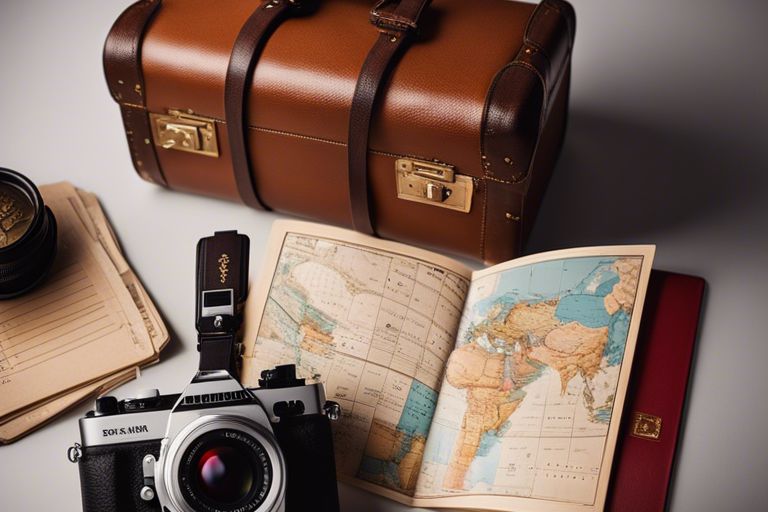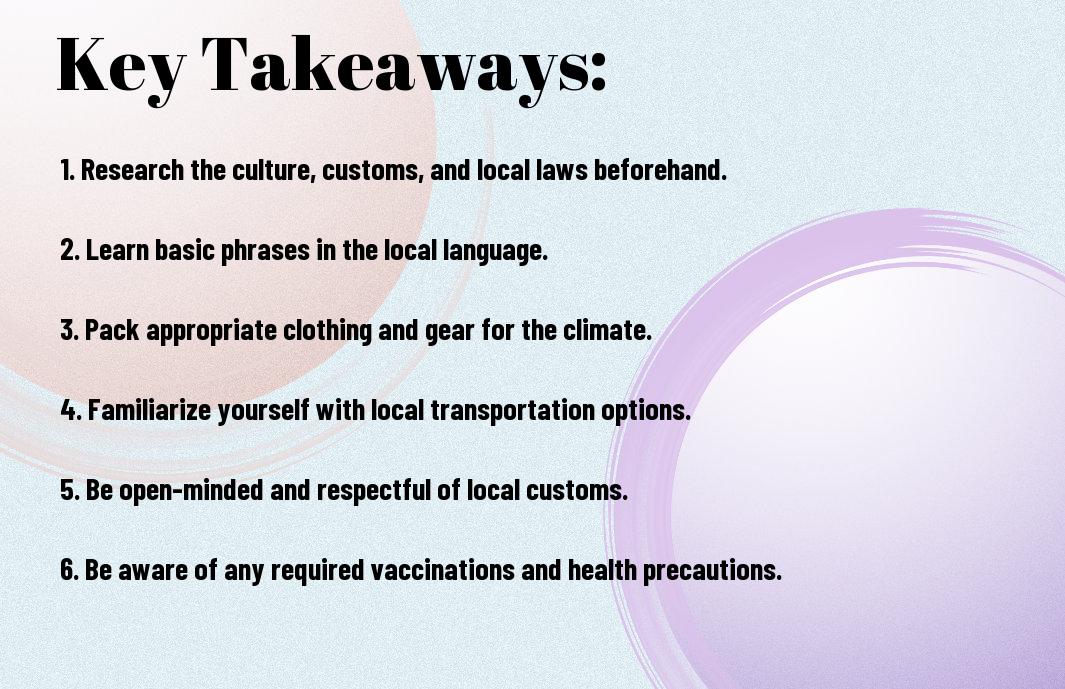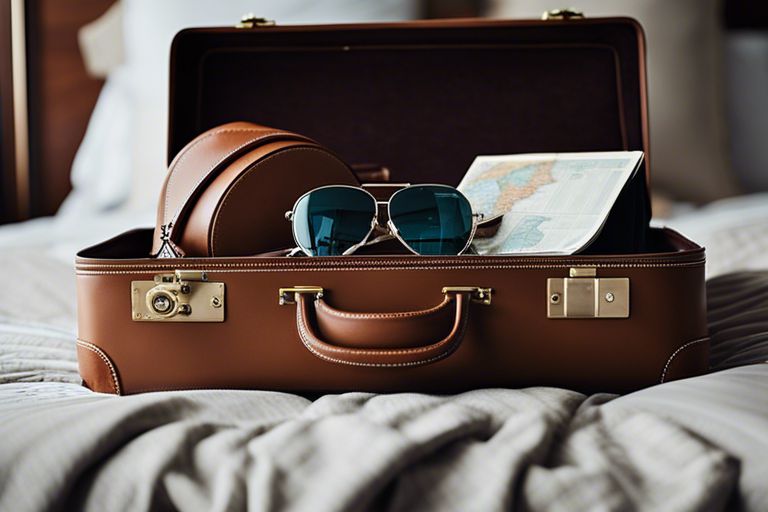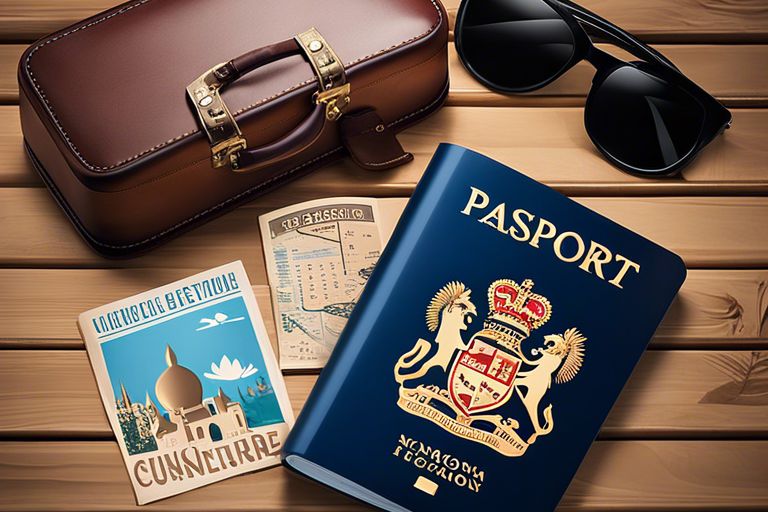Table of Contents
Embarking on a journey to a foreign land can be an exciting and enriching experience, but it’s essential to adequately prepare for the unknown challenges that may arise. Before you set off, it’s crucial to research and familiarize yourself with the cultural norms, customs, and laws of your destination to ensure you have a smooth and enjoyable experience. Additionally, be sure to take necessary precautions such as consulting a travel advisories, securing proper documentation, and protecting yourself from potential health risks to ensure a safe and memorable trip.
Key Takeaways:
- Research the culture: Understand the customs, norms, and traditions of the country you will be visiting to avoid unintentionally disrespecting or offending locals.
- Learn basic phrases: Familiarize yourself with common greetings, expressions, and essential vocabulary in the local language to facilitate communication and show respect to the locals.
- Check visa and passport requirements: Ensure that your travel documents are in order and comply with the entry regulations of the destination country to avoid any issues at immigration checkpoints.
- Pack appropriate clothing and essentials: Take into consideration the climate and cultural norms when selecting clothing and items to pack, and be prepared with necessary medication and travel accessories.
- Be open-minded and adaptable: Embrace the differences in culture, cuisine, and lifestyle, and be flexible in your expectations to fully immerse yourself in the new country’s experience.


Researching Your Destination
Some of the most crucial preparation for traveling to a new country or culture involves researching your destination. You should gather information about the local customs, etiquette, language, transportation, and safety before you embark on your journey. One excellent resource is the 10 Useful International Travel Tips for First-Time Travelers, which provides valuable insights into preparing for international travel.
Understanding local customs and etiquette
It’s essential to familiarize yourself with the customs and etiquette of the country you’ll be visiting. Every culture has its own set of social norms and practices that may be very different from your own. By understanding and respecting these local customs and etiquette, you can avoid inadvertently offending the locals and ensure a more enjoyable experience during your travels.
Language basics and communication tips
Prior to traveling abroad, it is important to learn some basic language phrases and communication tips. While English is widely spoken in many parts of the world, making an effort to communicate in the local language can go a long way in fostering positive interactions with the locals. In addition to learning common phrases such as “hello,” “thank you,” and “goodbye,” it’s also helpful to familiarize yourself with important keywords related to transportation, dining, and emergencies. Recognizing the local language and making an effort to communicate in it shows respect for the culture and can enhance your overall travel experience.
- Key phrases – Learn essential phrases in the local language to help you navigate and interact with locals.
- Language barriers – Be prepared for potential language barriers and consider carrying a translation app or phrasebook.
- Non-verbal communication – Understand cultural differences in non-verbal communication, such as hand gestures or personal space, to avoid misunderstandings.
Legal and Health Precautions
After deciding to travel to a new country or culture, it is important to take the necessary legal and health precautions to ensure a smooth and safe journey. This chapter will guide you through the essential steps to protect your legal rights and maintain your health while traveling.
Visa requirements and travel documentation
Before embarking on your journey, it is crucial to research and understand the visa requirements and travel documentation for the country you intend to visit. Some countries may require you to obtain a visa in advance, while others may allow you to obtain one upon arrival. Failure to comply with visa requirements can result in denied entry or deportation, so be sure to check the specific regulations for your destination. Additionally, make sure your passport is valid for at least six months beyond your planned return date, as many countries have this requirement for entry. Keep copies of your passport, visa, and other important travel documents in a separate and secure location, and consider leaving copies with a trusted contact at home.
Vaccinations and health considerations
Prior to traveling to a new country or culture, it is crucial to research and adhere to the recommended vaccinations and health considerations for your destination. Some countries may require certain vaccinations for entry, and others may pose health risks that can be mitigated through immunizations or preventive measures. Consult with a healthcare professional or a travel medicine specialist to determine the necessary vaccinations and health precautions for your trip. It is also important to familiarize yourself with any potential health hazards in your destination, such as endemic diseases, and take the necessary precautions to protect yourself. Strongly consider purchasing travel insurance that includes coverage for medical treatment and evacuation, as unforeseen health issues can arise during international travel.

Practical Travel Arrangements
Now that you have made the decision to travel to a new country or culture, it is important to make practical travel arrangements. This includes booking your flights, accommodations, and transportation within the country. Research the visa requirements for the country you are visiting and make sure your passport is valid for at least six months beyond your planned return date. Additionally, consider obtaining travel insurance to protect yourself in case of unexpected events.
Packing essentials for different cultures
When preparing for travel to a new country or culture, it’s important to be mindful of the local dress codes and customs. Pack clothing that is appropriate for the climate and cultural norms of the destination. Additionally, consider bringing items such as a universal power adapter, medication, and toiletries that may be difficult to find in the new country. It’s also a good idea to pack some basic phrases in the local language to help you communicate with locals.
Managing finances abroad
Managing your finances while traveling abroad is crucial to ensure a smooth and stress-free trip. Before you depart, notify your bank of your travel plans to prevent your accounts from being flagged for suspicious activity. Familiarize yourself with the local currency and exchange rates to avoid any surprises when making purchases. It’s also wise to carry a combination of cash and cards for convenience and security. Lastly, be cautious of public Wi-Fi and ATM scams that may compromise your financial information. Consider using a RFID blocking wallet or pouch to protect your credit cards and passport from electronic theft.
Cultural Immersion and Etiquette
However, understanding and respecting the local culture is essential for a successful trip to a new country. Cultural immersion involves learning about the social norms, customs, and traditions of the destination you are visiting. It is important to be aware of the etiquette and cultural practices to avoid unintentionally offending the locals and to make a positive impression.
Food and dining customs
When it comes to food and dining customs, it is important to be mindful of local traditions and manners. In some cultures, it is customary to eat certain foods with your hands, while in others, using utensils may be the norm. Additionally, there may be specific dining etiquette to follow, such as waiting for the host to begin eating before you start. It is also important to be aware of any dietary restrictions or taboos in the local culture to avoid inadvertently disrespecting your hosts.
Navigating social situations and making connections
Socializing and making connections in a new culture can be both rewarding and challenging. It is important to be open-minded and respectful of different social customs and communication styles. For example, in some cultures, direct eye contact may be seen as confrontational, while in others, it is a sign of respect. Understanding the nuances of nonverbal communication, greetings, and personal space is crucial for building rapport and creating positive interactions. Making an effort to learn a few basic phrases in the local language can also go a long way in breaking the ice and making meaningful connections.
By immersing yourself in the local customs and etiquette, you can gain a deeper appreciation for the culture and avoid inadvertently causing offense. Understanding the food and dining customs, as well as navigating social situations and making connections, will not only enhance your travel experience but also show respect for the culture you are visiting. Remember to be open-minded, adaptable, and respectful at all times, and you will find that your interactions and experiences in a new country will be enriching and fulfilling.
Conclusion
On the whole, preparing for traveling to a new country or culture requires careful planning and research. By familiarizing yourself with the culture, language, and customs of the destination, you can enhance your travel experience and minimize potential culture shock. It is important to be open-minded, respectful, and adaptable as you immerse yourself in a new environment. Additionally, being aware of any travel advisories or safety precautions can help ensure a smooth and enjoyable trip. Remember, the more prepared you are, the better equipped you will be to navigate the challenges and differences of a new country or culture. Bon voyage!
FAQ
Q: What should I do to prepare for traveling to a new country or culture?
A: Before traveling to a new country or culture, it is important to research and understand the customs, traditions, and social norms of the destination. This includes learning about the local language, currency, and any specific cultural etiquette. It is also essential to check the visa and entry requirements for the country and ensure that all necessary documents, such as passports and travel insurance, are in order.
Q: How can I adapt to the local customs and culture while traveling?
A: Adapting to the local customs and culture can greatly enhance your travel experience. One way to do this is by being open-minded and respectful towards the local traditions and practices. It is also helpful to observe and learn from the locals, as well as to participate in cultural activities and events. Additionally, making an effort to learn a few basic phrases in the local language can go a long way in showing respect and building connections with the local community.
Q: What should I pack for a trip to a new country or culture?
A: When packing for a trip to a new country or culture, it is important to consider the climate, local dress codes, and activities you plan to engage in. In addition to clothing and personal items, it is recommended to pack essential travel documents, medication, and any necessary adapters or converters for electronic devices. It is also advisable to bring along a basic first aid kit, as well as any specific items that may not be readily available in the destination country. Lastly, consider packing items that can be used as gifts or tokens of appreciation for local hosts or new acquaintances.

